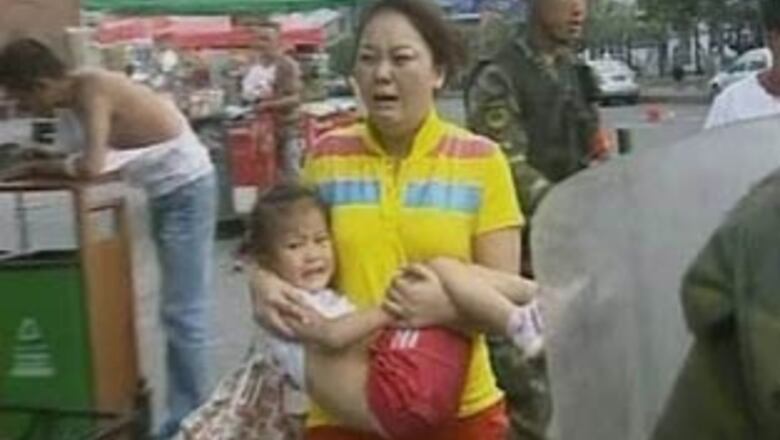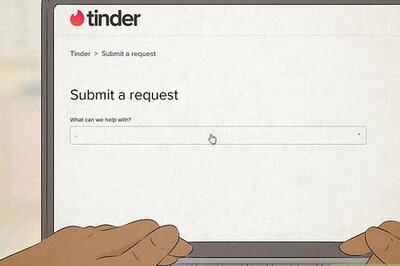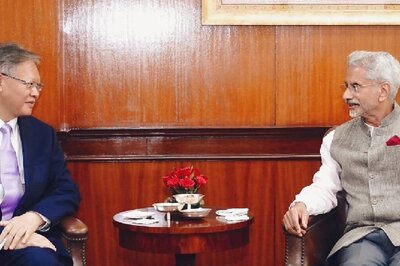
views
Urumqi: Chinese Police have arrested more than 1,400 suspects in connection with rioting in the capital of Muslim Xinjiang region which left 156 people dead and more than 800 injured, state media said on Tuesday.
Calm had settled over Urumqi, the region's capital, after 20,000 police, troops and firefighters reclaimed the streets from rioters who burnt and smashed vehicles and shops and clashed with security forces over Sunday night.
A total of 1,434 people had been detained, the official Xinhua news agency reported, although local residents said that police were making indiscriminate sweeps of Uighur areas.
Despite heightened security, some unrest appeared to be spreading in the volatile region, where long-standing ethnic tensions periodically erupt into bloodshed.
Police dispersed around 200 people at the Id Kah mosque in the Silk Road city of Kashgar on Monday evening, the day after the Urumqi rioting, Xinhua said.
The report did not say if police used force but said checkpoints had been set up at crossroads between Kashgar airport and downtown.
Human Rights Watch's Asia Advocacy Director, Sophie Richardson, called for an independent investigation into the unrest.
"Whoever started the violence, lowering ethnic tensions in the region requires the government to constructively address Uighur's grievances, not exacerbate them," she said.
Politically Sensitive
Along with Tibet, Xinjiang is one of the most politically sensitive regions in China and in both places the government has sought to maintain its grip by controlling religious and cultural life while promising economic growth and prosperity.
But minorities have long complained that Han Chinese reap most of the benefits from official investment and subsidies, making locals feel like outsiders.
PAGE_BREAK
Almost half of Xinjiang's 20 million people are Uighurs, while the population of Urumqi, which lies around 3,300 km west of Beijing, is mostly Han Chinese.
Chinese officials have already blamed the unrest on separatist groups abroad, who it says want to create an independent homeland for the Muslim Uighur minority.
Exiled Uighur businesswoman and activist Rebiya Kadeer, blamed by Chinese state media for being behind the violence, denied having anything to do with it.
"These accusations are completely false," Kadeer said.
In Washington, the White House said it was concerned about the deaths but it would be premature to speculate on the circumstances.
Muslim Uighur and Han Chinese residents of Urumqi gave accounts of bloodshed that are likely to deepen the chasm between the two sides.
Indiscriminate Sweeps
Uighur residents, speaking softly in alleyways away from patrolling police and troops, complained about the growing Han Chinese presence. Some said many of those arrested were youths caught up in indiscriminate police sweeps of the rundown concrete apartments where many Uighurs live.
"They've been taking away all the young people, going into our homes and taking them away," said Amina, a middle-aged woman in a Muslim headscarf sitting on the steps of a mosque. She said her own son had been taken but did not want to give his name.
Nearly all Uighurs traced the protests on Sunday back to their own anger over a confrontation in southern China in late June, when Han Chinese fought Uighurs working in a factory in Shaoguan after a false allegation that some of them had raped a Han Chinese woman.
The government said two Uighurs died in that clash, but many Uighur residents of Urumqi said they were sure that many more died.
Han Chinese residents said the toll from the riots was likely to rise.
Chen, a driver, said his wife who shares driving duties with him had suffered a badly cut eye when a Uighur youth attacked their car, and now she was afraid to venture far from home.
"Why doesn't the United States classify them as terrorists?" said Chen, who would not give his full name. "What they did to us is terrorism, isn't it?"
Riot victims recovering in a Urumqi hospital described groups of men who targeted Han Chinese.
"They didn't really talk to you," said Huan Zhangzhao, with two broken ribs and a bloodied eye. "When they saw you, when they saw a Han person coming along, they started to attack. When a bus came along, they started to attack."




















Comments
0 comment